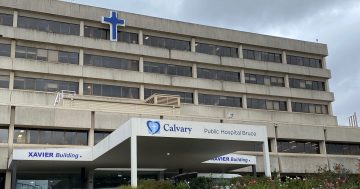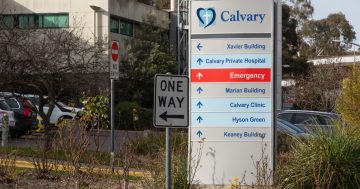
Supreme Court Chief Justice Lucy McCallum handed down the reasons for the court’s decision over Calvary’s legal argument on Friday (23 June). Photo: Michelle Kroll.
Calvary Health Care now has a chance to form a possible appeal against the acquisition of its Bruce public hospital after the Supreme Court handed down its reasons for finding the law allowing the takeover valid.
Chief Justice Lucy McCallum handed down the reasons on Friday (23 June), which Calvary Health Care’s lawyers need to see before deciding on their next steps.
Calvary’s lawyers had argued certain sections of the Act were invalid, as well as the Act as a whole and the associated regulation. Their main contention was around what constituted “just terms”, whether the regulation allowed for “full compensation” as opposed to “reasonable compensation”, and whether the Act contained “burdensome” terms.
The original arguments had been heard on 7 June, with a full panel of Supreme Court justices handing down their decision that the Health Infrastructure Enabling Act was valid on 9 June.
In the reasons published by the Supreme Court, the justices stated that “none of the grounds” put forward by Calvary’s legal team demonstrated that the Act as a whole or any of its provisions were laws the Legislative Assembly had no power to make.
“Insofar as Calvary’s proceedings involved a challenge to the validity of the Act, those proceedings were required to be dismissed,” the court stated.
The reasons outlined the arguments Calvary made for each of the provisions it was challenging.
One was around whether the Territory had used “aspirational language” when stating the acquisition of the hospital’s land had to be on “just terms”.
However, the court found imperative terms, such as “the Territory must”, indicated an “actual obligation” rather than a “mere aspiration or exhortation”.
Calvary also contended there were issues in parts of the Act that allowed for the acquisition of confidential information without providing any compensation or “other just terms”.
However, the court found the arguments were “pitched at a high level of generality”, with “no particular factual matters” referred to in order to establish the confidential nature of the information.
The argument remains over whether the associated regulation could be deemed invalid by the court.
Calvary’s primary challenge was to the validity of the regulations but argued they couldn’t be divorced from the provisions of the Act.
It submitted the Act and regulations needed to be considered together and that if either were found to be invalid, then the acquisition of Calvary Public Hospital Bruce as a whole was invalid.
The court disagreed with this approach.
“Clearly, if the Act was invalid as a whole then the Regulations, being subordinate laws made pursuant to the Act, would also be invalid,” the reasons stated.
“However, the converse is not necessarily the case. It would be possible for the Regulations to be invalid either in whole or in part, yet the Act not equivalently invalid.”
The court is yet to decide on the validity of the regulation.
The first chance Calvary Health Care has to launch its appeal against the Act ruling is next week when the case has been scheduled for a directions hearing in the Supreme Court.





















